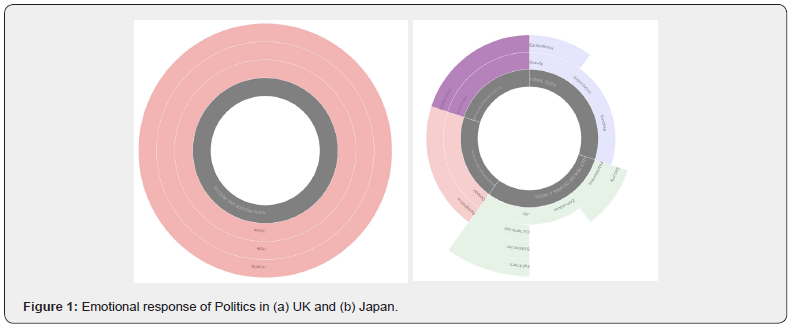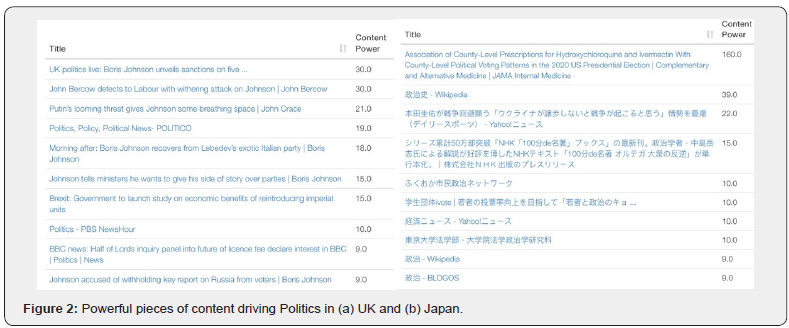Politics
Chris D Beaumont1*, Darrell Berry2 and John Ricketts3
1 Institute for Future Initiatives, LifeStylebyDesign, The University of Tokyo, Japan
2 Significance Systems, Brighton, UK
2 Significance Systems, Sydney NSW 2069, Australia
Submission: May 31, 2022; Published: June 17, 2022
*Corresponding author: Chris D Beaumont, Institute for Future Initiatives, LifeStylebyDesign, The University of Tokyo, 7-3-1 Hongo, Bunkyo-ku, Tokyo 113-0033, Japan
How to cite this article: Chris D Beaumont, Darrell Berry, John Ricketts. Politics. Int J Environ Sci Nat Res. 2022; 30(3): 556290. DOI: 10.19080/IJESNR.2022.30.556290
Keywords: Narratives; Utility; Social sharing; Engagement; Behaviour; People; Big data; AI; Important; Emotional response; Improved decisions; Leadership; Strategic leadership narrative
Context
COVID-19 has tested leadership around the world, and many have been found to be lacking in their response and politicians have widely demonstrated a failure to connect when the need was significant. This has been the case in both the UK and Japan where both government leaders have been under constant public scrutiny, for their perceived failures and insincere attitude. Japan’s PM Suga resigned taking responsibility for his governments handing of the pandemic in the wake of the Olympics, and at the time of writing, the UK’s PM is not listening for calls for his resignation from opposition and some colleagues, for flaunting his own COVID-19 laws.
In both countries concern for well-being and mental health has been increasingly voiced, but the response has varied due to other pressing challenges. In the UK the regional inequalities that gave rise to the geographic leveling-up policy has been diluted as Brexit and the war in Ukraine have fueled inflation and a dramatic rise in the cost of living. Globally, the pandemic increased inequality and in Japan this manifest itself in terms of both economic and diversity factors, the latter representing a failure of the 2013 commitment to ‘womenomics’ as part of Japan’s growth strategy.
Politics
Politics in the UK is a timeless narrative and people remain engaged with a positive, and active, affect orientation. However, their emotional response (Figure 1) says it all now with hostility currently fueling hate and dislike. The key topics driving the engagement are Boris Johnson and Party, not the political party but the illegal Christmas party (during lockdown) for which he has become the first sitting Prime Minister to be fined for an illegal act. People, in the UK, believe in politics but not this form of politics practiced under the Johnson leadership.


Heightened inequality, increased cost of living and Ukraine compound the governments’ standing (Figure 2).
In Japan, politics is transient partly reflective of its inherent lower relevance to people’s lives, as reflected in voting participation, as well as the lack of new content in the narrative, with a focus on the impact of COVID-19 on house and elections. Prime Minister Kishida’s poll numbers stay high. Ironically, it’s because there’s no-one else. Kishida is only the fourth PM to score these sort of numbers, and while there are some unique reasons why he’s in this position a staggering 42percent of respondents said that they supported him because there was no-one else. That says much about the sorry state of LDP politics (and indeed the Opposition). Government by the grey majority and resignation of no change and general indifference.
Implications
In difficult times, leaders come to the fore and take responsibility and, at the same time, others are found to be lacking and do not deserve the privilege! At such times, the great leaders communicate more and communicate often. They recognize the need for openness and the imperative to offer guidance and clarity.
Measuring and interpreting social and linguistic signals by accessing openly available online content, as in this paper, is naturally more directly reflective of human behavior, than traditional qualitative or quantitative survey methodologies. Critically, they also provide a coherent diagnostic base to understand, exploit and change behaviour, which is at the heart of any politician’s policy agenda. Our focus to measure long-term engagement for narratives is in keeping societal change but the ability to measure in real-time is especially potent during periods of volatility. ‘Engaging with engagement’ and being part of the ongoing story, naturally helps drive efficiency and effectiveness of communications, as well as critically confirming credibility and relevance.






























